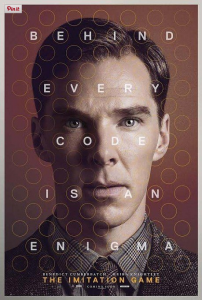film review: the imitation game
World War Two films don’t often show us what happened behind the scenes. Most often they are intently focused on depicting the horror and destruction of the front line, and not the work of mathematicians, engineers and scientists who used their minds rather than brawn to end the war.
One such mind was Alan Turing, a socially awkward yet brilliant mathematical genius who was reluctantly hired by the British Government to help break the infamous Nazi Enigma machine at the Bletchley Park Radio headquarters. Benedict Cumberbatch, giving the performance of his career, brings Turing to life on screen with incredible passion and bravery.
The Imitation Game attempts to find a balance between depicting Turing’s dedicated professional life and his tragic personal life, namely as a homosexual man during a time when it was demonised and punishable. Three narratives are woven together in the film. The first is set in 1951 during a police investigation into Turing’s personal and professional records. The second sends us back to Turing’s school days in the 1920s, where we observe his social ineptitude, his gift for maths and the discovering of his sexuality. The third narrative is given the majority of our attention and that is of Turing’s attempts to break the Enigma code by creating the world’s first super computer.
Accompanied by a team of code breakers who spend years trying to find the right way to break the code, Turing’s story offers a fascinating insight into the little-known and super secretive world of code breaking. Their chances of finding the right combination are almost impossible, and they have only a certain amount of hours each day before the code is reset and they have to start all over again. They are literally working against the clock, which certainly gives the film excitement in the thriller department. But where the film truly succeeds is within its emotional scenes, which are definitely plentiful.
During his time at Bletchley Park, Turing finds an allied outsider in Joan Clarke (Keira Knightley), a young woman who proves to be just as capable of cracking the enigma with her mathematical prowess as any of the men. However, she is forced to join the secretarial ranks and only in secret can she help Turing crack the Enigma code. As both outsiders in a world of order, discipline and hyper-masculinity, Joan as a woman and Alan as a homosexual man, form a close platonic bond that becomes the heart and soul of the film.
Handled with precise care by Norwegian director, Morten Tyldum, any sense of a sterile and tense Scandi-thriller is replaced with a slow burning pace and a very British sense of national pride. In fact, along with Mike Leigh’s Mr Turner and the Stephen Hawking biopic, The Theory if Everything, The Imitation Game is one of the best British films of the year.
Initially I had unfairly judged The Imitation Game as purely an Oscar bait vehicle for Cumberbatch, but it appears to be much more than that. The film depicts a crucially important story of a brave and pioneering man, whose research and advancements in computing technology changed the world. A criticism of the film could be that it does skip over a fair portion of Turing’s post-war life and his work on computing, but a bit of biographical reading could fix all that.
Rather simply, The Imitation Game is a beautiful film in both visual and narrative aspects. With solid direction from Tyldum and a brave performance from Cumberbatch, it is an entertaining interpretation of an important story that truly needed to be told right.


